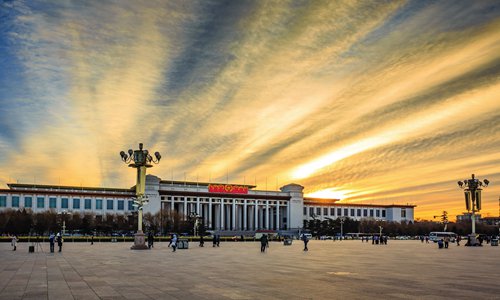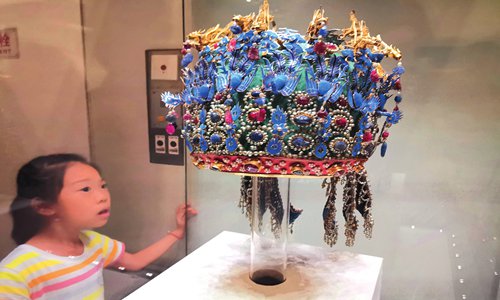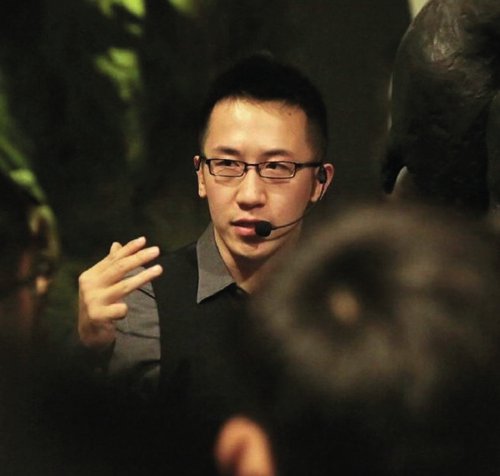HOME >> CHINA,METRO BEIJING
Narrating history
By Li Jieyi Source:Global Times Published: 2019/9/24 18:48:40
Museum docent Yuan Shuo believes objectivity is the best way to tell Chinese stories well

The National Museum of China Photo: IC

A girl looks at an exhibit at the National Museum of China. Photo: IC

Yuan Shuo introduces an exhibition to visitors at NMC. Photo: Courtesy of Yuan Shuo
Yuan Shuo, a 31-year-old docent, is surrounded by visitors as he guides them on a journey of discovery through Chinese history. In 2011, he became one of the many docents in the National Museum of China (NMC) since its establishment in 1912.Eight years ago, when he started to work as a docent in the museum, he could only dream of being surrounded by so many visitors. At that time, going to museums was far less popular among the Chinese than it is today. Even in one of China's top museums, which is located in the capital, there were few visitors each day.
But now, he has already become a well-known docent, not only in real life, but also online. After giving a 37-minute speech about the history of humans from an anthropological perspective on an online live-stream in 2017, he became a sensation and was known to many as Hesenberg. He named himself after the German physicist Werner Heisenberg, the person he admires most, but changed Hei into He, which means river in Chinese. Hei has the same sound as Hai, which means "ocean" in Chinese. Yuan said he wanted to be as knowledgeable as Heisenberg but could never surpass him, just as a river can never be larger than the sea.
His profound knowledge and style of narrating history continuously attracts followers online. Now, he has over 4 million fans on the Twitter-like Weibo and more than 370,000 followers on another social media platform Zhihu.
From being an unknown to someone admired by many, the changes he has experienced as a docent make him feel that in her 70th year, the People's Republic of China (PRC) is developing in high spirits.
Feeling the world's pulse
Yuan was a student of computers but dreamed of writing plays. "The premise of writing a good story is that you should try to feel and understand the world widely and deeply. But how do you make this happen?" said Yuan.
After graduating from the Capital Normal University, he chose to become a docent in NMC, where he felt he could learn more about the world.
At the beginning, everything seemed to be difficult. Under the rules of NMC, Yuan had to start giving guides of exhibitions even when there was no one following him.
"Sometimes, I asked the few visitors I could find at the museum to hear my introduction. But they just said 'no' and then left impatiently," he said. He could not find anyone to help him build the relationship as a bridge between visitors and exhibitions.
As the years passed, he's no longer a docent with no visitors. More people are going to museums than before. Teachers and parents of teenagers highly value museums as somewhere their children can acquire knowledge outside school.
According to the Ministry of Culture and Tourism, there were 10,160 historical relics institutions (including museums and protection organizations) in 2018, a 95 percent increase compared to 2010. And the number of visitors also surged from 52,098 to 122,387, of which the number of young people went from 13,541 to 29,665.
"Culture is accumulating," Yuan said. The rich culture formed over China's long history is spreading widely among people and enriching their lives. And they are the future of the country.
Truth is beautiful
Chinese culture is also attracting attention from other countries and regions, and is spreading across the globe. Now, it is common to see foreign visitors in China going to museums. Some of them left a deep impression on Yuan.
He can still remember a Japanese scholar who bowed to the exhibit to show his respect before taking a look at it, while some visitors from Europe and the US were fascinated by the history of the Ming and Qing dynasties (1368-1911). He also encountered foreign scholars in the museum who sometimes brought postgraduates with them. "Chinese culture is a part of the world's culture. It is a treasure for people around the world," said Yuan.
According to xinhuanet.com, from 2016, many museums from countries along the Silk Road have formed a friendly alliance. Under the Belt and Road Initiative, the nonprofit international community of museums promotes the exchanges of cultural relics and talent. The historical relics and the culture behind them is something that can boost people-to-people communication and remind us of the past. Yuan can still remember a visitor who was over 100 years old. After he attended the exhibition The Road of Rejuvenation - one of the three permanent exhibitions at NMC, which shows China's history from 1840 - he said [our country] is getting better and better. "He could be said to be a witness of the 20th century, so the words meant a lot to me," said Yuan, who said that the people he has met and the things he has experienced make him love the job more.
Like other docents in China, he narrates Chinese history to the public. And with the PRC about to celebrate its 70th birthday, there will be more Chinese stories to tell in the future. "Our job is to present the true face of Chinese history objectively," Yuan said.
RELATED ARTICLES:
- An exhibition of Xinjiang cultural relics kicks off at the National Museum of China
- An exhibition of 96 sets of porcelain artifacts from 11 museums across the country kicked off at the National Museum of China
- An exhibit featurs cultural relics from 47 Asian countries, Greece and Egypt opened at the National Museum of China on Monday
Posted in: SOCIETY,METRO BEIJING